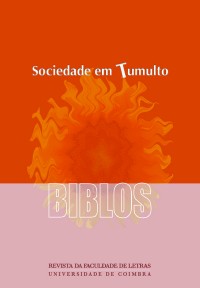Please use this identifier to cite or link to this item:
https://hdl.handle.net/10316.2/32696| DC Field | Value | Language |
|---|---|---|
| dc.contributor.author | Fialho, Maria do Céu | - |
| dc.date.accessioned | 2014-07-07T11:51:00Z | |
| dc.date.accessioned | 2020-09-18T09:09:58Z | - |
| dc.date.available | 2014-07-07T11:51:00Z | |
| dc.date.available | 2020-09-18T09:09:58Z | - |
| dc.date.issued | 2009 | - |
| dc.identifier.issn | 0870-4112 | - |
| dc.identifier.uri | https://hdl.handle.net/10316.2/32696 | - |
| dc.description.abstract | In Seven against Thebes, the Greek city, besieged by Greeks, is a mirror of the political fragmentation which was already perceptible in Hellas at that time. Civil war takes the shape of a process of ‘Barbarization’ of the Greeks. Thebes represents the space of political rupture in Hellas, and Aeschylus calls attention, once again, to the consequences of internal struggles. | eng |
| dc.description.abstract | Em Sete contra Tebas a cidade grega sitiada por Gregos é espelho da fragmentação política que já se torna visível na Hélade do tempo. A guerra civil assume a natureza de um processo de ‘barbarização’ do Gregos. Tebas representa o espaço de ruptura política da Hélade e Ésquilo chama a atenção, uma vez mais, para as consequências das lutas internas. | por |
| dc.language.iso | por | - |
| dc.publisher | Faculdade de Letras da Universidade de Coimbra | - |
| dc.subject | Aeschylus | eng |
| dc.subject | Civil War | eng |
| dc.subject | Polis | eng |
| dc.subject | Greek/Barbarian | eng |
| dc.subject | Women | eng |
| dc.subject | Ésquilo | por |
| dc.subject | guerra civil | por |
| dc.subject | pólis | por |
| dc.subject | Grego/Bárbaro | por |
| dc.subject | mulheres | por |
| dc.title | Ésquilo e o contexto histórico da composição e representação de Sete contra Tebas | por |
| dc.type | article | - |
| uc.publication.collection | Biblos vol. VII | - |
| uc.publication.firstPage | 29 | - |
| uc.publication.lastPage | 42 | - |
| uc.publication.location | Coimbra | - |
| uc.publication.journalTitle | Biblos | - |
| uc.publication.volume | 7 | por |
| dc.identifier.doi | 10.14195/0870-4112_7_1 | - |
| uc.publication.section | Artigos | - |
| uc.publication.digCollection | IP | - |
| uc.publication.digCollection | B1 | - |
| uc.publication.orderno | 2 | - |
| uc.publication.area | Artes e Humanidades | - |
| uc.publication.manifest | https://dl.uc.pt/json/iiif/10316.2/32696/218150/manifest?manifest=/json/iiif/10316.2/32696/218150/manifest | - |
| uc.publication.thumbnail | https://dl.uc.pt/retrieve/11290263 | - |
| uc.itemId | 71756 | - |
| uc.thumbnail.uri | https://dl.uc.pt/iiif-imgsrv/11290235/dl!3!38!48!28!38482824619759192514705136883083785509 | - |
| item.grantfulltext | open | - |
| item.fulltext | With Fulltext | - |
| Appears in Collections: | Biblos | |
Files in This Item:
| File | Description | Size | Format | |
|---|---|---|---|---|
| biblosvii_artigo2.pdf | 488.8 kB | Adobe PDF |  |
Items in DSpace are protected by copyright, with all rights reserved, unless otherwise indicated.
